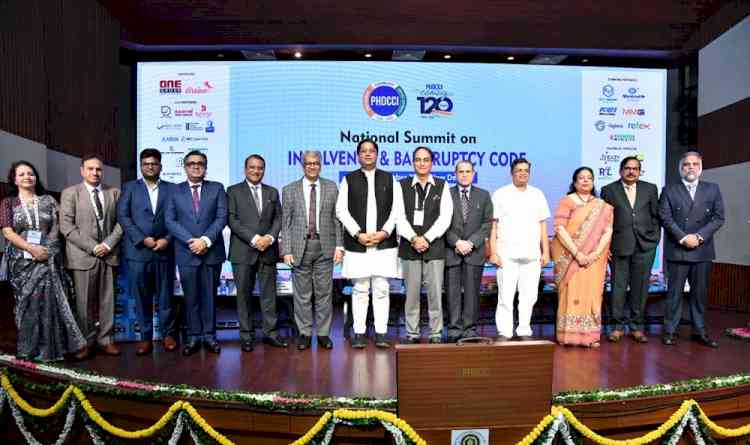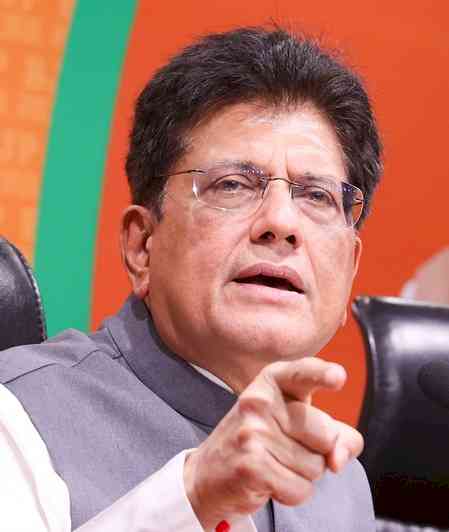National Summit on Insolvency & Bankruptcy Code & Awards
The PHD Chamber of Commerce and Industry (PHDCCI) convened the National Summit on Insolvency & Bankruptcy Code (IBC) & Awards 2025 recently at PHD House, New Delhi. The day-long summit brought together members of the judiciary, legislators, regulators, insolvency professionals, economists and business leaders to deliberate on the IBC’s journey, the 2025 amendment, and its contribution to India’s economic framework.

New Delhi, September 22, 2025: The PHD Chamber of Commerce and Industry (PHDCCI) convened the National Summit on Insolvency & Bankruptcy Code (IBC) & Awards 2025 recently at PHD House, New Delhi. The day-long summit brought together members of the judiciary, legislators, regulators, insolvency professionals, economists and business leaders to deliberate on the IBC’s journey, the 2025 amendment, and its contribution to India’s economic framework.
G. P. Madaan, Chair, NCLT & IBC Committee, PHDCCI, welcomed the dignitaries and participants. He emphasized the transformative role of the IBC in strengthening India’s corporate and financial ecosystem and pointed to the importance of reforms that minimize litigation, improve efficiency and create predictable outcomes.
Dr. U. K. Chaudhary, Senior Advocate and President of the NCLT Bar Association, traced the development of the IBC since its introduction in 2016, explaining how it has strengthened creditor confidence while also identifying areas where further refinements are needed. He highlighted the relevance of the 2025 Amendment Bill in addressing delays and in providing greater clarity on issues such as cross-border and group insolvency.
Ashish Mohan Wig, Chair of the HR IR Committee, PHDCCI focused on the human and workforce dimensions of insolvency. He noted that insolvency does not only concern financial statements but also impact employment and communities. He emphasized that any reform in this area must recognize the balance between financial discipline and social responsibility.
Sudhaker Shukla, Former Whole Time Member of the Insolvency and Bankruptcy Board of India highlighted the importance of institutional capacity building and the empowerment of insolvency professionals. He emphasized that effective enforcement of the Code, supported by streamlined processes, is essential for delivering time-bound and credible outcomes.
Gopal Krishna Agarwal, Economist and National Spokesperson of the BJP emphasized that the Code has improved investor confidence, strengthened India’s Ease of Doing Business credentials and positioned the country as a serious and disciplined market. He noted that the IBC is an essential component of India’s goal of reaching a five trillion dollar economy.
Chandan Chauhan, Member of Parliament, Lok Sabha, outlined the role of Parliament in refining the Code through successive amendments. He stressed that legislative oversight is key to ensuring transparency, fairness and responsiveness, especially in sectors such as real estate and MSMEs which require tailored solutions.
Justice Mukta Gupta (Retd.), Former Judge of the High Court of Delhi, emphasized the judiciary’s role in ensuring consistency, predictability and timely disposal of insolvency matters. She highlighted the responsibility of the judiciary to maintain the spirit of the Code by reviving viable businesses while maximizing value for creditors.
Justice N. Seshasayee, Member (Judicial) of the NCLAT, emphasized the importance of balancing time-bound resolutions with fairness, underlining that efficiency must not come at the cost of justice and that appellate forums must ensure value is preserved while safeguarding due process.
The inaugural session concluded with a vote of thanks, marking the beginning of the technical deliberations.
The first technical session on IBC (Amendment) Bill 2025 was chaired by Justice Mukta Gupta (Retd.) and moderated by G. P. Madaan, with Dr. Ashok Mishra, Avisa Fakki, Shri Smiti Tewari and Shikhil Suri as panelists. The second session on Success Stories under CIRP and Liquidation was chaired by Prof. (Dr.) Anupam Jha and moderated by Abhishek Anand, with contributions from Harish Taneja, Jalesh Grover, Ranjana Roy Gawai, Pankaj Sethi and Anil Kohli. The third session on Revival of Real Estate Companies under IBC was chaired by L. N. Gupta and moderated by Karan Mehra, with insights from Apoorv Jain, Pankaj Agarwal, Rahul Madan, Rachit Mittal and Risham Garg. The fourth session on Insolvency Resolution of Personal Guarantors to Corporate Debtors was chaired by Sanjiv Sen and moderated by Manisha Chaudhary, with Anil Kohli, Sanampreet Singh and Dr. Rajesh Kumar Yaduvanshi as panelists.



 City Air News
City Air News 










